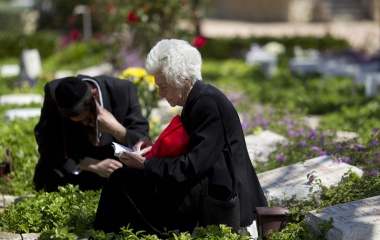
The economic aspect of marriage is generally more pronounced amongst parents, who often desire to raise their status by having their children marry into the "right" family. While a girl from a wealthy family may fall in love with a pauper, it is rare for the girl's parents to share those feelings.
"Rabbi Akiva was the shepherd for Kalva Savua. His daughter saw how modest and refined he was. She said to him, if I marry you, will you agree to study in the Beit Midrash?" (Ketubot 62b). Kalva Savua was one of the three wealthiest people[1] in Jerusalem in the first century CE (Gittin 56a). The notion that the one who was shepherd to his flock would be his son-in-law was preposterous. His daughter felt otherwise and married Rabbi Akiva "in private"[2]. She understood that approval would not come for this marriage, and when her father heard of it, he promptly "removed her from his house and took a vow that she not receive any benefit from his possessions" (Ketubot 62b). When Akiva the shepherd returned as the great Rabbi Akiva, Kalva Savua sought to have his vow annulled (Ketubot 63a). Had he known that his son-in-law would be a leader of the Jewish people, he would never have taken such a vow[3]. Based on the premise that he vowed to disown his daughter for marrying Akiva the shepherd, but not Rabbi Akiva the Torah scholar, his vow was annulled[4]. Say what you may, but our Sages were great realists!
While this story may have a happy ending, many others do not. "One who agreed to give [a large sum of] money to his son-in-law, and he died, the Sages say, He may say: To your brother I wanted to give but to you I do not want to give" (Ketubot 66a). In anticipation of the marriage of his daughter, a father provides a large dowry for his daughter. Unfortunately, the husband dies between the period of betrothal (Eirusin) and the actual marriage (Nissuin). Though the couple was never fully married, the obligation of yibum sets in at betrothal, and the brother of the deceased must do yibum and marry his sister-in-law; or chalitzah, freeing her to marry others.
Such is the obligation of the brother of the deceased. However, there is no obligation on the father to provide for an equal dowry--despite the fact that he was prepared to pay such for the first brother, and despite the fact that one who does yibum "acquires the assets of his brother". As the brother died before the wedding, the dowry had not yet become his property, and the second brother can do little beyond rue his situation. He must, however, still do yibum even as he receives a lesser dowry, or do chalitzah and move on.
Why the father does not want to provide an equal dowry--despite the hard feelings likely to follow--is not relevant. "Our Rabbis taught: there is little need to state this when the first [brother] was a Torah scholar and the second [brother] ignorant, but rather, even if the first was ignorant and the second a Torah scholar, he may say: 'To your brother I wanted to give, to you I do not want to give" (Ketubot 66b).
While there is a certain degree of harshness in this case, there is also much to be thankful for. There are all kinds of reasons why people marry--or don't--and that is a choice that people must be allowed to make. As we saw in our last post it is not always easy to marry a Torah scholar. By the same token, many--for good reason--would prefer marrying someone of the same socio-economic class (or even of a lower socio-economic class) as opposed to someone much wealthier. And while the mitzvah of kibud av v'eim does not apply in choosing a marriage partner[5] (see Rama, Yoreh Deah 240:25), parents retain the right to shower gifts on their adult children (it is the husband, not the father, who is obligated to support the family) as they see fit. This may not always be pleasant, but do we want it any other way?
[1] His name translates as a satiated dog, as "one who came to his house starving like a dog left it satiated".
[2] Significantly and sadly, she is not even mentioned by name--in the context of the story, she is just an extension of her wealthy father.
[3] Then as now, many gvirim, Jewish leaders, look for a son-in-law to join the business or for one who is a great Torah scholar.
[4] As our Sages note, heter nedarim porchim b'avir, "the annulment of vows is floating in the winds", and they have little to rely on (Chagigah 10a). Little, save for human nature, where a mechanism is needed to allow people to retract that which should not have been said in the first place.
[5] The obligation of honouring parents is to serve them--go shopping for them, drive them to an appointment, call and visit them--but not to have them live vicariously through you.



